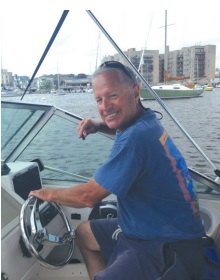Vietnam & Beyond by Jenny La Sala and Jim Markson | Books in Review

In Vietnam & Beyond: Veteran Reflections (Trafford, 292 pp, $24.99, hardcover; $14.99 paper, $3.99 ebook), Jim Markson reports on his 366 days in-country—he’s one of the 1968 Leap Year victims “keenly aware” of the extra day to “get hurt or killed.” Using a familiar memoir pattern in the book’s first half, Markson includes letters he wrote home, and supplements them with contemporary news clips, along with his reflections on the whole thing.
Co-author Jenny La Sala merits high praise for preserving memories of soldiers like Markson. She developed compassion for people suffering the aftereffects of war while dealing with her father, a World War II veteran; her ex-husband Markson; and her brother, who served in the Gulf War. Prior to this book, she wrote her father’s memoir, Comes a Soldier’s Whisper .
The core of Markson’s combat experience was surviving the 1968 Tet Offensive as an Air Force security policeman at Tan Son Nhut Air Base. Greatly outnumbered, Markson and his fellow APs kept attackers from overrunning the base long enough for other U.S. forces to join the battle. I was at Tan Son Nhut during Tet and vividly recall the awe everyone felt for the APs’ heroic actions.
Prior to that, Markson’s year had been relatively calm. His letters contained messages such as “Yesterday I went into Saigon and had shrimp cocktail and yes, a filet mignon”; “I feel a little guilty when I collect that combat pay”; and “Things here at Tan Son Nhut have been pretty quiet.”
Then, shortly after he turned 20, Tet happened. Markson lost his youth, along with his “naivety” and “blind trust in authority and things [he] just took for granted.”
Markson’s writing has a slight apologetic tone. He went to war full of patriotism bred from respect for his father’s World War I service. Following his return to the United States, Jim Markson—as was the case with many Vietnam veterans—felt disdained by society, particularly by war protesters. He temporarily disassociated himself from the Army by letting his hair grow long, wearing bell-bottoms, and growing a beard.

Jim Markson
Based on the tone of his writing, it appears that Markson still retains vestiges of that rejection. Nevertheless, he has overwhelming pride for having “been part of the [Vietnam] experience.” In 2007, doctors finally identified his forty-year battles with night terror as PTSD.
In the book’s second half, La Sala presents interviews with men and women veterans from World War II, and the wars in Korea, Afghanistan, and Iraq. These short accounts follow the pattern of Markson’s service: patriotic young men transformed by battle. Those who escaped physically unscathed paid the price of long mental anguish.
At the same time, their reflections on the past are a tribute to human fortitude. In the most casual manner, they deliver lines that transcended their pain and suffering.

Jenny La Sala
For example, Don Crizer of the 1st Air Cav says: “Our unit was on a continuous search-and-destroy mission, with one spanning 87 days straight” as if it was no big deal. Former infantryman Delmer Presley describes several horrible incidents and then says: “I will never be the same.”
John Sutor, another former infantryman, recalls a Major who told his company, “If I tell you to go out there and die, you will go and die. You will be remembered for your honor and duty to your country. Dismissed.”
To Sutor, the order was merely a fact of life. The Major was killed in action.
World War II veteran Guy Whidden summed up the mood by saying: “We knew exactly where we were going, but not what was to become of us.”
Vietnam veteran Morris Spitzer provided my favorite quote from the book: “It is not our abilities that show what we truly are. It is our choices.”
The authors’ website is www.vietnamandbeyond.com
—Henry Zeybel

